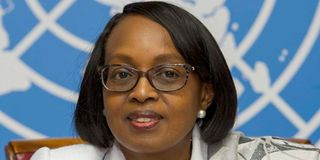WHO starts campaign about suicide, mental health crisis in Africa

Dr Matshidiso Moeti, the WHO regional director for Africa.
The World Health Organisation (WHO) has launched a campaign to raise awareness and spur action for suicide prevention in the African region, which has been found to have the world’s highest rates of death by suicide.
Every year, 703,000 people take their own lives — and there are many more people who attempt suicide. In 2019, death by suicide was the fourth leading cause of death among 15- to 29-year-olds globally. In Africa, about 11 people in every 100,000 die by suicide annually. The region is home to six of the 10 countries with the highest suicide rates worldwide.
The social media campaign, launched last Thursday ahead of World Mental Health Day, aims to reach 10 million people across the region to raise public awareness and “galvanise the support of governments and policymakers to increase focus and funding for mental health programming, including suicide prevention efforts” according to the UN health agency.
Every suicide is considered a tragedy that affects families, communities and entire countries and has long-lasting effects on the people left behind. Numbers in the African continent are extremely high in part due to insufficient action to address and prevent the risk factors, including mental health conditions which currently affect 116 million people, up from 53 million in 1990.
Due to the low investment in mental health services, Africa has one psychiatrist for every 500,000 people, which is 100 times less than what WHO recommends. Additionally, mental health workers are mostly in urban areas, with primary and community health facilities having few, if any.
In Kenya, almost 500 people were reported to have died by suicide in the three months to June 2021, according to the police.
The 483 deaths recorded during the period were a marked increase on the annual average of about 320 cases, the Ministry of Health additionally reported. The Kenya National Commission on Human Rights said in 2020 that 1,442 Kenyans attempted suicide between 2015 and 2018. It noted that those were conservative figures as only a fraction of cases were reported.
The organisation linked the rise in cases to mental ill-health caused by a breakdown in socio-economic safeguards, saying it was the “last resort and path of escape for individuals with unaddressed mental health needs”.
Kenya has been urged to repeal Section 226 of the Penal Code that criminalises attempted suicide. Launching the Suicide Prevention Strategy 2021-2026 in August, the Ministry of Health said their goal is to attain a 10 percent reduction in suicide mortality by the end of 2026.
The new WHO campaign is meant to equip health workers to better support people dealing with suicidal thoughts, educate those who may experience suicidal thoughts on where to go for help as well as sensitise the public on how to identify and help those in need. It also seeks to help tackle the stigma associated with suicide, epilepsy, mental health conditions, and alcohol and drug abuse.
“Suicide is a major public health problem and every death by suicide is a tragedy. Unfortunately, suicide prevention is rarely a priority in national health programmes. Significant investment must be made to tackle Africa’s growing burden of chronic diseases and non-infectious conditions such as mental disorders that can contribute to suicide,” said Dr Matshidiso Moeti, WHO Regional Director for Africa.
This year’s World Mental Health Day (marked every October 10) was marked under the theme “Make Mental Health and Well-Being for All a Global Priority” to draw attention to the importance of mental health care and the need for better access to health services.



